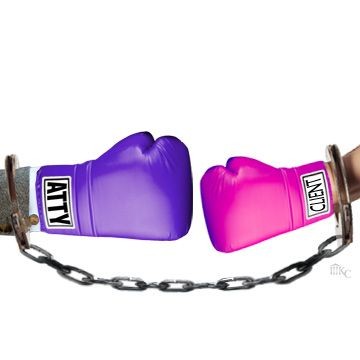The Lawyer's Lawyer
Binding Clients to Arbitration
Q. After lengthy litigation, we recently collected a large outstanding bill from a client who filed a frivolous counterclaim against us for malpractice. To prevent this from happening again, may we require binding arbitration in future retainer agreements?
A. You may include binding arbitration clauses in your retainer agreement.
But the Rules of Professional Conduct give little guidance on how to implement them. Can you just insert them into your agreement and have the client sign? Must you explain the pros and cons of such clauses? Or must you go even further and have your client to consult with independent counsel before consummating such agreements?
Arbitrating Fee Disputes
Virtually all states encourage the arbitration of fee disputes. Many jurisdictions, and virtually all bar associations, have established arbitration panels to resolve fee disputes. When used, the process can spare both sides the expense and aggravation of a lawsuit.
Rather than require that the client be independently represented before signing off on such an agreement, most jurisdictions require the client's informed consent in the form of a retainer agreement which fully discloses the risks and benefits of arbitration.
Arbitrating Malpractice Claims
There is less consensus on how to implement agreements to arbitrate legal malpractice claims. Although Rule 1.8(h) forbids us from making "an agreement prospectively limiting the attorney's liability to a client for malpractice unless the client is independently represented in making the agreement," it "does not," according to the comments to this rule, "prohibit a lawyer from entering into an agreement with the client to arbitrate legal malpractice claims, provided ... the client is fully informed of the scope and effect of the agreement."
Some jurisdictions, like the District of Columbia, have taken this to mean that informed consent is all that is required. Just across the border, Maryland's ethics committee has expressed the opposite view and would insist that the client be independently represented before signing such an agreement.
The safest approach is also the most restrictive. As most arbitrators are lawyers themselves, arbitration may tend to limit the lawyer's liability more than a jury of laypersons. Viewed in this manner, clients ought be advised independently before agreeing to arbitrate potential malpractice claims.
Informed Consent Always Required
Regardless of jurisdiction, all states require, at a minimum, that we obtain the client's informed consent after full disclosure of all risks and benefits associated with arbitrating fee disputes or malpractice claims. While arbitration is faster, usually cheaper and less formal, you must advise clients of the rights they would relinquish in the process. By agreeing to arbitrate future disputes, clients waive their rights to a jury trial, to significant discovery, and to the formal appeals process that is provided to litigants in court. Unlike court, the parties will also be responsible for the arbitrators' fees and the costs of the arbitration process.
Practice Tip: Avoid Malpractice Arbitration Clauses
An arbitration clause may spare clients significant expense, but could cost you something you've already paid for — insurance coverage.
Under the terms of your legal malpractice policy, you must cooperate fully in the defense of your case and must not do anything which may limit your carrier's options in defending you. By contracting to arbitrate the claim without the carrier's written consent, you would breach that duty and may unwittingly lose your coverage.
Beyond a forfeiture of coverage, the burdens of litigation may work to your advantage. By making it less expensive to raise malpractice claims, arbitration clauses remove some of the deterrence that an expensive litigation process may provide. Having greater access to legal resources and a strong familiarity with an otherwise intimidating judicial system, lawyers may benefit from the very discovery process and evidentiary restrictions that arbitration would largely eliminate.
For this reason, you may wish to arbitrate future fee disputes. But it's probably better to avoid malpractice arbitration clauses entirely.
